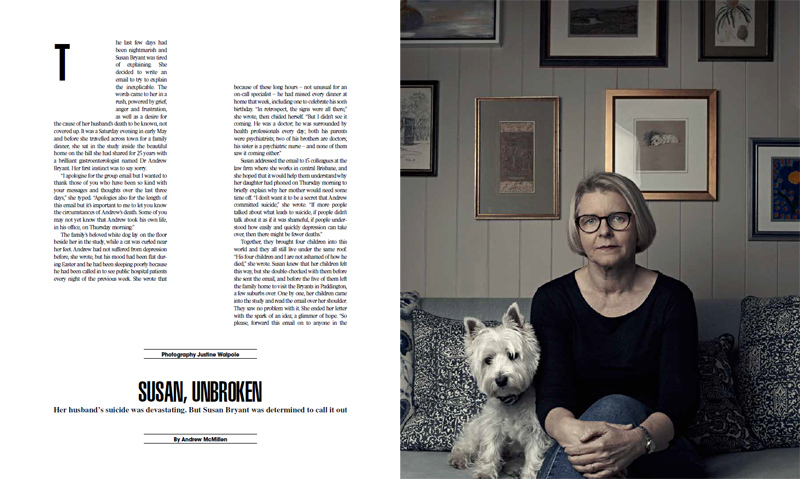The Weekend Australian Magazine story: ‘Susan, Unbroken: After Dr Andrew Bryant’s suicide’, September 2017
A feature story for The Weekend Australian Magazine, published in the September 2-3 issue. Excerpt below.
Her husband’s suicide was devastating. But Susan Bryant was determined to call it out.
The last few days had been nightmarish and Susan Bryant was tired of explaining. She decided to write an email to try to explain the inexplicable. The words came to her in a rush, powered by grief, anger and frustration, as well as a desire for the cause of her husband’s death to be known, not covered up. It was a Saturday evening in early May and before she travelled across town for a family dinner, she sat in the study inside the beautiful home on the hill she had shared for 25 years with a brilliant gastroenterologist named Dr Andrew Bryant. Her first instinct was to say sorry.
“I apologise for the group email but I wanted to thank those of you who have been so kind with your messages and thoughts over the last three days,” she typed. “Apologies also for the length of this email but it’s important to me to let you know the circumstances of Andrew’s death. Some of you may not yet know that Andrew took his own life, in his office, on Thursday morning.”
The family’s beloved white dog lay on the floor beside her in the study, while a cat was curled near her feet. Andrew had not suffered from depression before, she wrote, but his mood had been flat during Easter and he had been sleeping poorly because he had been called in to see public hospital patients every night of the previous week. She wrote that because of these long hours — not unusual for an on-call specialist — he had missed every dinner at home that week, including one to celebrate his son’s birthday. “In retrospect, the signs were all there,” she wrote, then chided herself. “But I didn’t see it coming. He was a doctor; he was surrounded by health professionals every day; both his parents were psychiatrists; two of his brothers are doctors; his sister is a psychiatric nurse — and none of them saw it coming either.”
Susan addressed the email to 15 colleagues at the law firm where she works in central Brisbane, and she hoped that it would help them understand why her daughter had phoned on Thursday morning to briefly explain why her mother would need some time off. “I don’t want it to be a secret that Andrew committed suicide,” she wrote. “If more people talked about what leads to suicide, if people didn’t talk about it as if it was shameful, if people understood how easily and quickly depression can take over, then there might be fewer deaths.”
Together, they brought four children into this world and they all still live under the same roof. “His four children and I are not ashamed of how he died,” she wrote. Susan knew that her children felt this way, but she double-checked with them before she sent the email, and before the five of them left the family home to visit the Bryants in Paddington, a few suburbs over. One by one, her children came into the study and read the email over her shoulder. They saw no problem with it. She ended her letter with the spark of an idea; a glimmer of hope. “So please, forward this email on to anyone in the Wilston community who has asked how he died, anyone at all who might want to know, or anyone you think it may help.” It took her about five minutes to write. She sent it at 5.45pm on Saturday, May 6, and then she went to be with Andrew’s family.
The next afternoon, Susan thought that a few of her close friends and neighbours might like to read the message. And so, at 2pm on the Sunday, she passed it on to another five people who live in the inner north suburb of Wilston. When two of her children asked if they could share the email on Facebook, she said yes, because she thought that it might help their friends understand what had happened, too.
Within a few days, her words had been read by hundreds of thousands of people around the world. Her email was republished and discussed online and off; both inside and outside the medical profession. It was as though she had shot a flare skyward on a dark night, and suddenly, she found herself surrounded by strangers who were drawn to the distress signal.
People responded to her honesty with their own. They wrote to her with deep, dark secrets and confessions, some of which they dared not speak aloud. She gathered their letters and cards in a large basket that sits in the centre of her kitchen bench, while hundreds more notes piled into her email inbox. Writing to her helped them. She did not know it when she wrote the email, but they needed Susan Bryant then, and they need her now.
To read the full story, visit The Australian. Above photo credit: Justine Walpole.
For help if you are in Australia: Suicide Call Back Service 1300 659 467; Lifeline 13 11 14, Survivors of Suicide Bereavement Support 1300 767 022.
For help if you are outside of Australia, visit suicide.org’s list of international hotlines.
